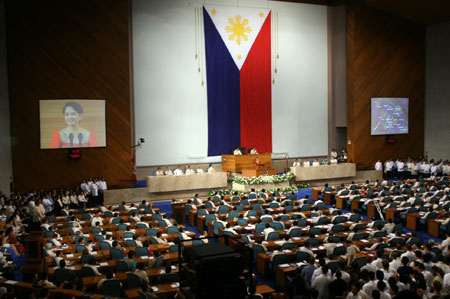
"Sa telecommunications naman, inatasan ko ang Telecommunications Commission na kumilos na tungkol sa mga sumbong na dropped calls at mga nawawalang load sa cellphone. We need to amend the Commonwealth-era Public Service Law. And we need to do it now.
Kung noong nakaraan, lumakas ang electronics, today we are creating wealth by developing the BPO and tourism sectors as additional engines of growth. Electronics and other manufactured exports rise and fall in accordance with the state of the world economy. But BPO remains resilient. With earnings of $6 billion and employment of 600,000, the BPO phenomenon speaks eloquently of our competitiveness and productivity. Let us have a Department of ICT."
These were the lines of Pres. Gloria Macapagal Arroyo utter in the SONA last July 2009. These good Impacts to ICT has brought great oppotunities to Filipinos.
President Arroyo site 3 areas related to IT that has greatly help in the improvement of the quality of life of Filipinos.
First, President Arroyo urged Congress to inaugurate Department of Information and Communication Technology. This is good news. Ray Anthony Roxas-Chua III, chairman of the Commission on Information and Communications, has long batted for the creation of a DICT.Under Executive Order 269, which created CICT, the Commission would not just be advisory in nature but will have a more active role in implementing the various ICT-related plans and policies of government. The Commission also handles government initiatives to development more IT proficient workers in the country, improvement of government IT services and bringing more Filipinos closer to technology.
EO 269 clearly notes that the CICT was formed to handle ICT policy while waiting for Congress to create a Department of Information and Communications Technology that would more effectively coordinate and implement national ICT programs. Through this implementation, more careers in IT are within reach.
Second, President Arroyo tasked Telecommunication Commission about Dropped Calls and lost Cellphone Loads.The National Telecommunications Commission must “do more” than extend the expiry of prepaid load to decisively end the issue of “vanishing prepaid load” that is bedeviling the country’s more than 70 million mobile phone subscribers.
According to TXTPower(consumer advocacy group TXTPower.org Inc.), the NTC should compel telcos to finally offer “unlimited calls” and “unlimited texting” as permanent, not promotional, offers.
Third,The President also requested for the amendments of the Common wealth-era public Service Law. The President also urged Congress to pass the Philippine Transport Security Authority Law, immediate amendments to the Commonwealth-era Public Service Law, and the creation of a Department of Information and Communications Technology to better serve the $6-billion business-process outsourcing (BPO) industry that currently employs 600,000 Filipinos.
wealth-era public Service Law. The President also urged Congress to pass the Philippine Transport Security Authority Law, immediate amendments to the Commonwealth-era Public Service Law, and the creation of a Department of Information and Communications Technology to better serve the $6-billion business-process outsourcing (BPO) industry that currently employs 600,000 Filipinos.
The Business Processing Association of the Philippines (BPAP) is the umbrella organization for the fastest-growing industry in the Philippines: offshoring and outsourcing (O&O). BPAP serves as the one-stop information and advocacy gateway for the country's key O&O services sector and has over 200 company members, including 5 association members.
BPAP's thrust is to promote the competitive advantages and the growth potential of the Philippines in existing and new areas of outsourcing and supports the industry in areas such as offshore marketing, education and training, security and privacy, legislation and public policy, among others. It aims to create a supportive environment for the Philippine O&O industry and strengthen the Philippine case to be the preferred O&O destination by the end of the decade.
Given the excess global demand for O&O resources and the attractiveness of the resources the Philippines has to offer, BPAP believes it is possible for the Philippines to increase its share of the global O&O market from 5 percent in 2006 to 10 percent in 2010. This will mean the Philippine O&O industry will earn revenues of about USD13 billion and directly employ close to one million people by the end of 2010.
The Philippine O&O industry has grown rapidly because it has the ingredients critical to O&O service providers and customers:
* large-scale people resources, with close to half-a-million English-speaking students graduating from college yearly;
* quality, with a well-deserved reputation for excellence in communication skills, interpersonal warmth, customer-service orientation, problem-solving abilities, and cultural affinity with Western markets and customs;
* an operational cost advantage, with costs competitive with any supplier country in the world, including India;
* infrastructure, with world-class telecommunication networks and BPO workplace facilities; and
* financial incentives, with highly competitive investment packages for information technology (IT) and IT-enabled services investors, whether third-party services providers or captive regional shared services centers.
investors, whether third-party services providers or captive regional shared services centers.
The three citations has great impacts.all has a say on the improvement of the quality of life of every Filipinos. Thus, formulating laws are important to impose important concerns like this. The SONA indicates achievements and future plans... ICt is a blooming industry. A helping hand of nation's progress. May magagawa kung kikilos.
http://www.abs-cbnnews.com/technology/07/27/09/arroyo-oks-creation-ict-department
http://www.abs-cbnnews.com/business/07/27/09/gma-pushes-new-sin-taxes
http://bpap.org/bpap/index.asp?welcome2
http://www.txtpower.org/2009/07/to-solve-vanishing-load-scam-ntc-must-lower-rates-ban-spam-txtpower/
Wednesday, September 30, 2009
SONA 2009 about ICT
Posted by frozen_flower at 12:00 PM
Subscribe to:
Post Comments (Atom)

0 comments:
Post a Comment